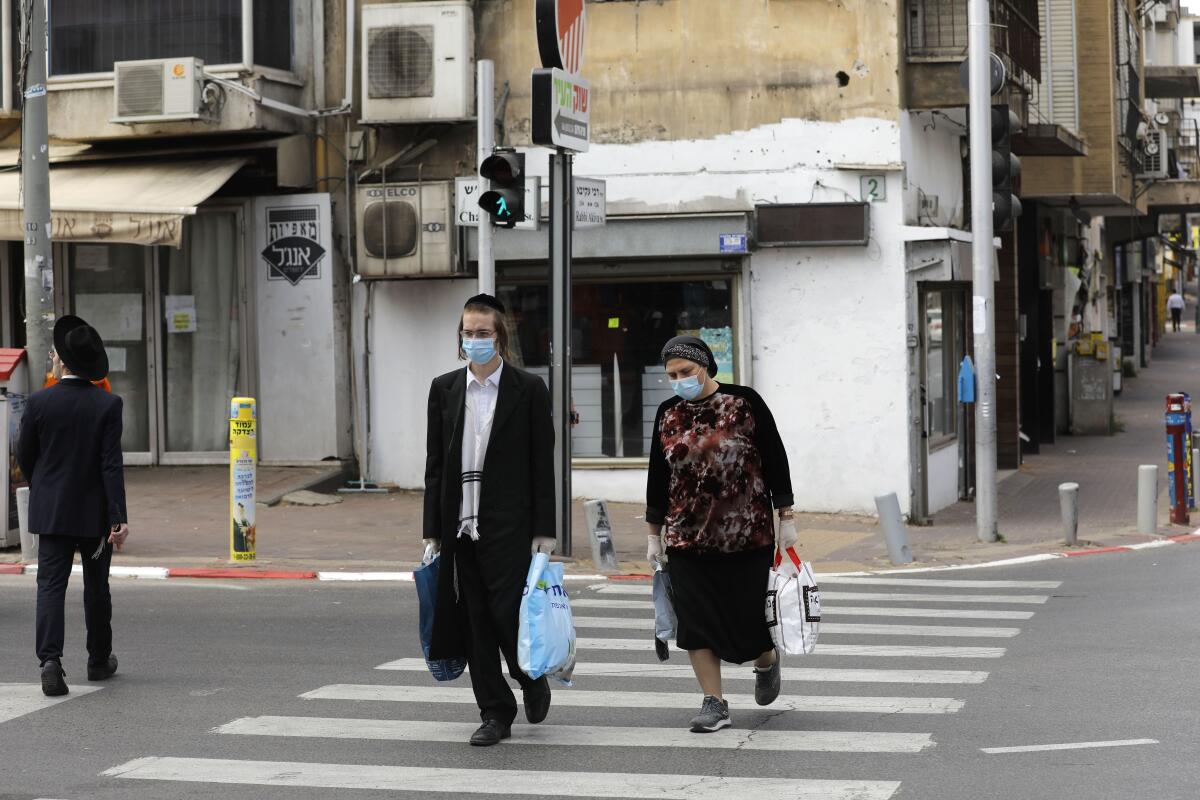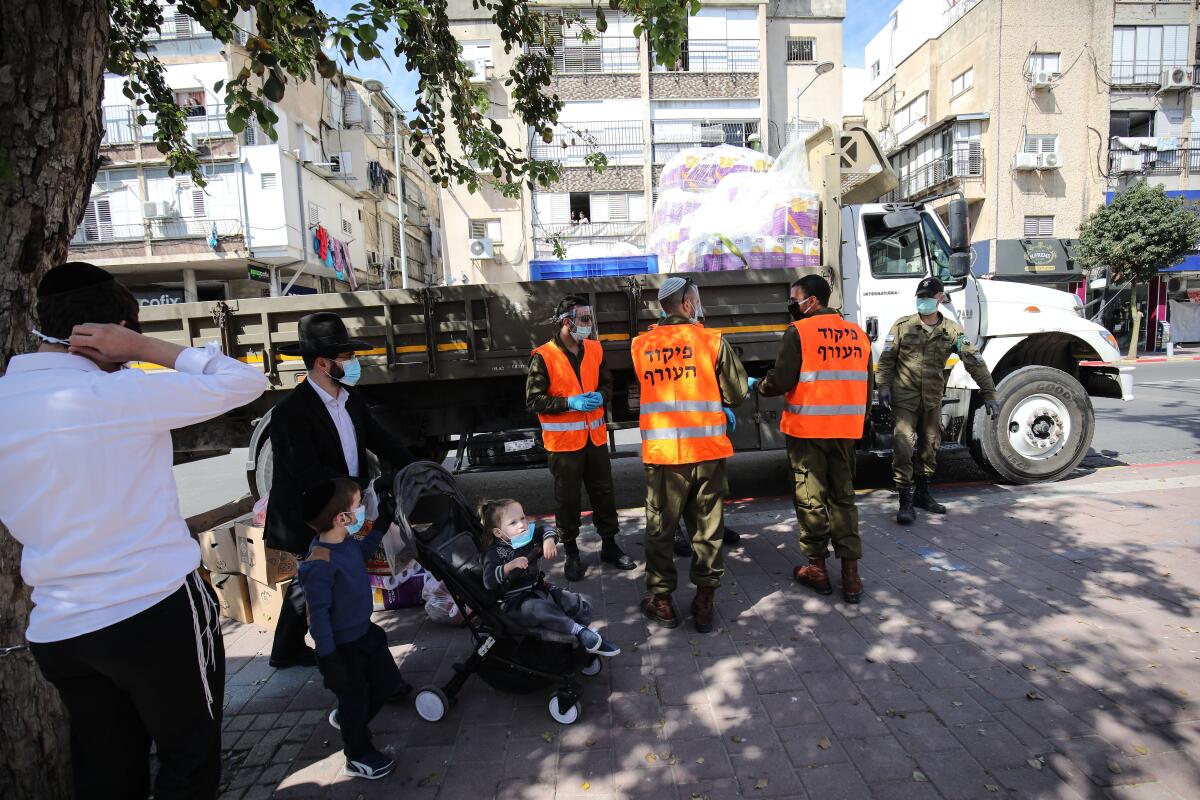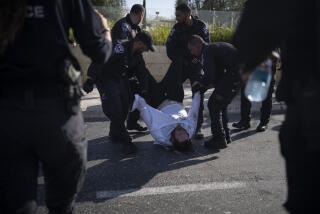Ultra-Orthodox Jews hit disproportionately hard by Israel’s coronavirus outbreak

- Share via
JERUSALEM — Israel Cohen had barely stepped out of the hospital when his phone rang.
“I’m sorry,” Cohen said as a strong wind gusted around him. “My grandfather died 10 minutes ago. I’ll call you back.”
For the record:
4:39 p.m. April 8, 2020This story was corrected to reflect that Prime Minister Benjamin Netanyahu announced a plan to evacuate elderly residents of Bnei Brak due to coronavirus danger but that the plan was not implemented.
His grandfather, 91-year-old Zalman Cohen, belonged to the insular world of the haredim, the black-coated ultra-Orthodox Jews known as “those who tremble before God.”
A Hungarian-born Jew who survived Auschwitz, Zalman Cohen died April 2 of the coronavirus, at a moment of growing peril for his small, vulnerable community. He was the country’s 36th victim, a toll that has since nearly doubled, hitting the ultra-Orthodox particularly hard and further raising suspicions of a way of life many secular Jews find alien.
Among the haredim, cultural factors such as big families, crowded living conditions and a bone-deep devotion to communal religious rituals and gatherings have set the stage for the swift spread of the virus, fueled by the community rabbis’ traditional resistance to outside authority.

Zalman Cohen’s death added to the grim toll in Bnei Brak, a haredi-dominated township east of Tel Aviv that has become a locus of Israel’s COVID-19 infections. The same day he died, the Israeli Cabinet declared Bnei Brak a restricted zone, instituting a military closure on one of the world’s most densely populated communities.
Israeli medical authorities fear that close to 40% of Bnei Brak’s 200,000 residents, who live in a 2.7-square-mile warren of tightly packed apartments, schools and stores, may be infected. As the closure took effect, police helicopters buzzed overhead, paramilitary police patrolled residential streets, and soldiers controlled all entry points at roadblocks.
The clampdown came less than a week before the start of Passover, the major Jewish festival that began Wednesday — a precursor to a wider ban this week on movement across the country to slow the virus’ spread.
Israel Cohen has watched the disease march through the neighborhoods of ancestors. A political analyst for the ultra-Orthodox radio station Kol BaRama and a columnist for the liberal daily newspaper Haaretz, he views the unfolding tragedy with a dual perspective rare for a haredi.
On the one side is a ravaged community, which feels itself under siege from within and without, a largely sequestered world of prayers and ancient customs. On the other, a wider Israeli society that fears the virus’ spread and resents prominent haredi rabbis for encouraging people to ignore government warnings and pay little heed to social distancing.
Bnei Brak’s “significant morbidity and high rate of coronavirus infection” justified the sealing off of the community, the government said. As testing intensified and illness spread, the number of patients rose past 1,400, second only to Jerusalem, with five times Bnei Brak’s population.
Spurred by deaths like that of Zalman Cohen, Prime Minister Benjamin Netanyahu announced a plan to evacuate all Bnei Brak residents 80 and older— 4,500 of them in all — and relocate them to requisitioned hotels, even by force. For many of that generation, the notion of such a roundup carried chilling historical overtones, and in some cases personal ones as well.
Amid an outcry, the plan was dropped. As the Sabbath was about to begin last week, only about 100 infected elderly residents agreed voluntarily to be moved.
Cohen, 38, said he had often asked his grandfather, who was born in Nyiregyhaza, Hungary, why the Jews didn’t flee before the Nazis stormed Europe. He said his grandfather would answer that no one knew what was coming.
In Bnei Brak, many were also caught unawares while infections silently spread at family and community gatherings.
“Nobody could see it,” said Cohen. He believes his grandfather may have been infected on March 9, when multitudes crowded into local synagogues to celebrate the joyous Jewish holiday of Purim, drinking wine and dancing together.
The ultra-Orthodox community’s standing in the eyes of secular Israelis was further shaken last week after the health minister, Yaakov Litzman, an ultra-Orthodox rabbi, announced that he and his wife, Hava, had tested positive for the virus.
Netanyahu, who has since tested negative, was ordered into quarantine due to numerous recent encounters with Litzman, whose ministry is charged with spearheading Israel’s public response to the pandemic.
Overall, Israel has aggressively fought the outbreak of the conronavirus since January. But for weeks, Netanyahu resisted pressure to take action in Bnei Brak.
That changed, however, for a number of reasons, notably the power Litzman holds as a representative of United Torah Judaism, a small ultra-Orthodox party that plays an outsized role in Israeli coalition politics.
For weeks, Litzman opposed measures affecting his community’s customs and rites, such as crowded Sabbath prayers and regular visits to ritual baths. Israeli media reported that the minister defied his own ministry’s guidelines, praying in a synagogue days after communal worship was banned.
In the early days of the crisis, some key sources of authority in the haredi community shrugged off the dangers.
On March 1, the eve of Israel’s general elections, the editor of a haredi tabloid tweeted that Rabbi Chaim Kanievsky, a prominent figure, was promising immunity from the coronavirus to anyone voting for United Torah Judaism. Kanievsky, 92, was also recorded saying that religious studies remained imperative despite the pandemic, causing thousands of parents to send their children to overcrowded classrooms.
He and other community eminences have since changed course, but the virus was already accelerating.
The coronavirus crisis could add to long-standing strains between secular and ultra-Orthodox Jews, who make up about 12% of the country’s population of 9 million. Unlike other Israeli Jews, they are exempt from army service, subsidized by a state whose authority they question. Their communities are all but an autonomous state within the state, said Shahar Ilan, the author of a book on the sector and its political entanglements.
He said the virus’ heavy toll among the ultra-Orthodox was the result of years of government capitulation to the demands of haredi political leaders, who in turn deny their followers access to mass media and tools like basic scientific literacy, hewing to traditional teachings and Torah study.
Israeli police, meanwhile, find themselves at the forefront of the nation’s battle to contain the spread of infection among haredim. That at times gives them the distasteful task of wrestling with demonstrators clad in prayer shawls, or facing down children who shout imprecations at them.
Police spokesman Micky Rosenfeld pointed to the responsibility of local and religious leaders to convey vital guidelines to a community whose members “are not online, don’t have telephones, don’t have radios, don’t have televisions and do not know what is going on in the real world.”
Cohen, though, said the government botched its efforts to communicate the dire nature of the situation to his community. He faulted Netanyahu for not dispatching doctors and scientists to win over key rabbis in the outbreak’s earliest days.
“They didn’t speak the language of haredim,” he said.
Tarnopolsky is a special correspondent.
More to Read
Sign up for Essential California
The most important California stories and recommendations in your inbox every morning.
You may occasionally receive promotional content from the Los Angeles Times.













